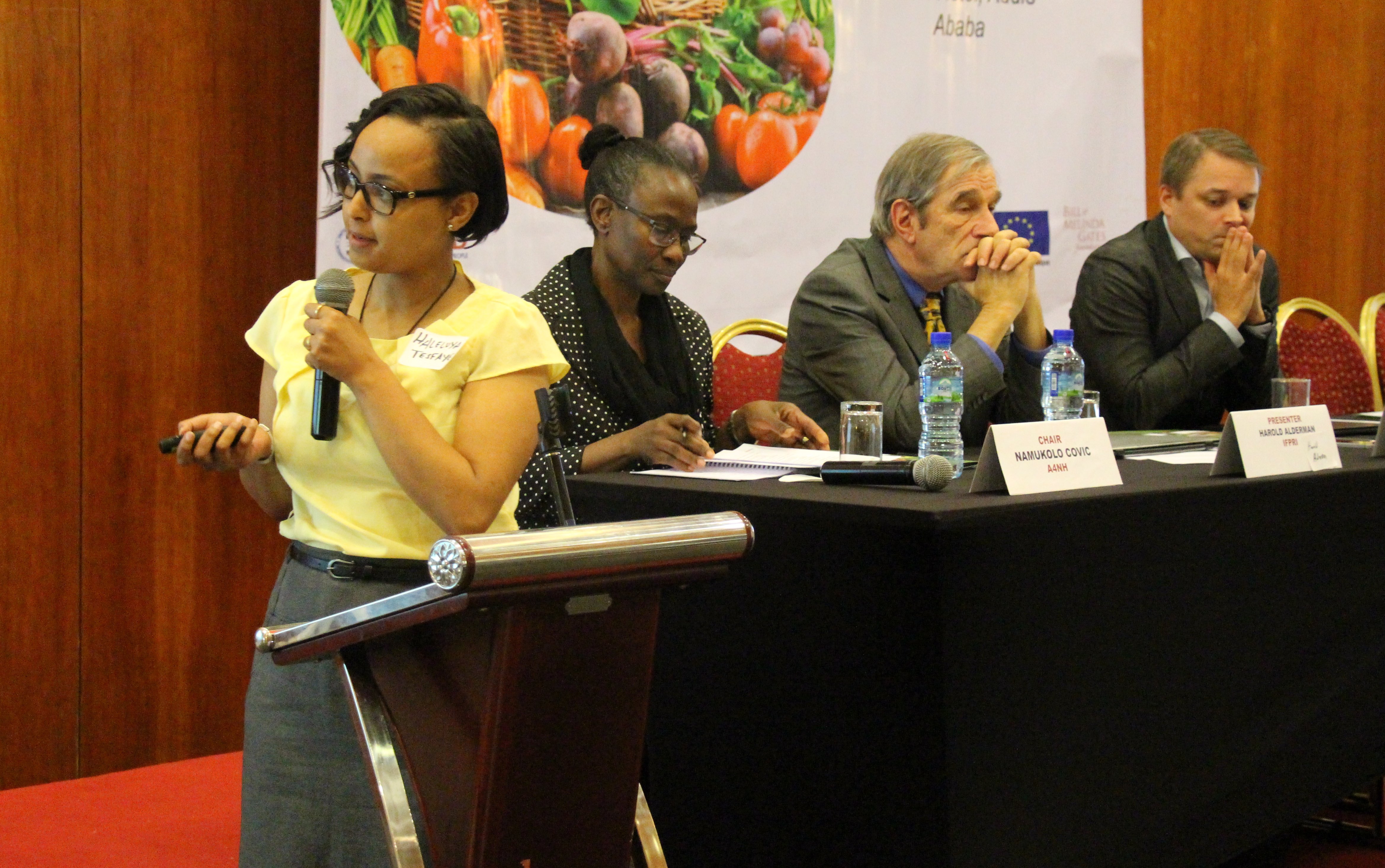Ethiopia has made substantial progress in addressing malnutrition over the last decade. The National Nutrition Program (NNP), has gradually expanded in scope since its 2008 launch. The Sequota Declaration Implementation Plan—aimed at ending undernutrition by 2030—has fostered work across sectors. Stunting (low height for age) rates dropped from 51% to 38% between 2005 and 2016.
Yet many children remain stunted and dietary diversity is still a challenge, even as food systems are changing rapidly. In March, the Ethiopian government launched the National Food and Nutrition Policy (NFNP), which promotes a coordinated and comprehensive approach to food and nutrition security and stresses the importance of access to nutritious foods.
The NFNP is expected to play a major role in addressing Ethiopia’s nutrition challenges. That will depend on its implementation. At the Ethiopia National Nutrition Conference in Addis Ababa Dec. 12, researchers from IFPRI, the CGIAR Research Program on Agriculture for Nutrition and Health (A4NH), and local partners the Policy Studies Institute (PSI) and the Ethiopian Public Health Institute (EPHI) presented policy-oriented evidence derived from large household datasets that has the potential to guide the implementation decision-making process, as well as to help the National Information Platform for Nutrition (NIPN).
“This evidence is timely, because the diets of many Ethiopians remain very monotonous, and we have not seen much change in diet diversity. In fact, only less than 10% of young children in Ethiopia meet the minimum acceptable diet,” said EPHI Senior Researcher Asefa Deressa, opening the conference.
Stunting has been linked to higher risk of mortality, poor cognitive performance, as well as low productivity and earnings and higher risk of chronic diseases later in life. According to Kaleab Baye of Addis Ababa University, the key to stopping stunting is starting interventions as early as possible, ideally during pregnancy, focusing on improving maternal diet and health status and on ensuring that the mother is properly nourished. Proper nutrition during pregnancy is associated with lower risk of maternal anemia.
Worldwide, 59% of children are not getting sufficient nutrients from animal-source foods while only 56% eat any fruits or vegetables at all—and the numbers are much worse in Ethiopia, Arnaud Laillou of UNICEF said. On the positive side, Ethiopia is one of the countries where breast feeding practice is prevalent, with 75% of mothers doing it until their children reach 24 months. Mothers’ fasting remains one of the bottlenecks to children getting proper nutrition, affecting 45% of the population, he said: 200 out of the 365 days are fasting days as defined by the Ethiopian Orthodox Tewahedo Church. When fasting, people have no more than one meal a day and abstain from animal products including meat, dairy, and eggs. When mothers fast, children typically end up fasting as well. Changing this practice for children requires education for mothers and an investment on food transformation.
What about the cost of a healthy diet? The dietary diversity researchers advocate is hard to achieve because of affordability, according to Harold Alderman of IFPRI: The poorer the setting, the higher the relative cost of a diverse diet. This is especially true for the EAT-Lancet reference diet—which, according to a recent study from IFPRI and Tufts University, is not affordable for 1.6 billion people in the world. In Ethiopia, the cost of nutritious foods has increased over time, according to a study by Bachewe et al., but the affordability of food prices has also improved thanks to rising incomes. More attention to the supply of nutritious foods in the country is required in order to keep prices low.
The Ethiopian government and its partners have been working on implementing several interventions to address the dietary diversity problem. One Alive and Thrive project used a Social and Behavior Change (SBC) approach to promote appropriate infant and young child feeding (IYCF). Productive Safety Net Programme (PSNP) cash and food transfers enable households to obtain more food as well as supporting and encouraging caregivers toward achieving a healthy and more diverse diet for their children. The Improved Nutrition through Integrated Basic Social Services and Social Cash Transfer Program (IN-SCT) focuses on monthly nutrition counseling, antenatal care visits, post-natal care, child vaccinations, attendance to growth monitoring and promotion sessions, and regular checkups of children, and has been utilizing education and child protection services. The Agricultural Growth Program (AGP) focuses on increasing production of nutritious foods and household dietary diversity.
According to IFPRI’s Alemayehu Seyoum Taffesse, some evidence shows these interventions work to varying degrees, but more work is needed on several fronts: To understand the fasting phenomenon; to examine the cost of healthy diets by life cycle stages; when best to make effective interventions; and to pay appropriate attention to heterogeneity of context and impact, particularly the role of markets and the link between infrastructure investment and nutrition.
Nahume Yadene is Program and Administrative Manager of IFPRI’s Ethiopia Strategy Support Program, based in Addis Ababa. Presentations and publications used during the conference can be found here and here.







